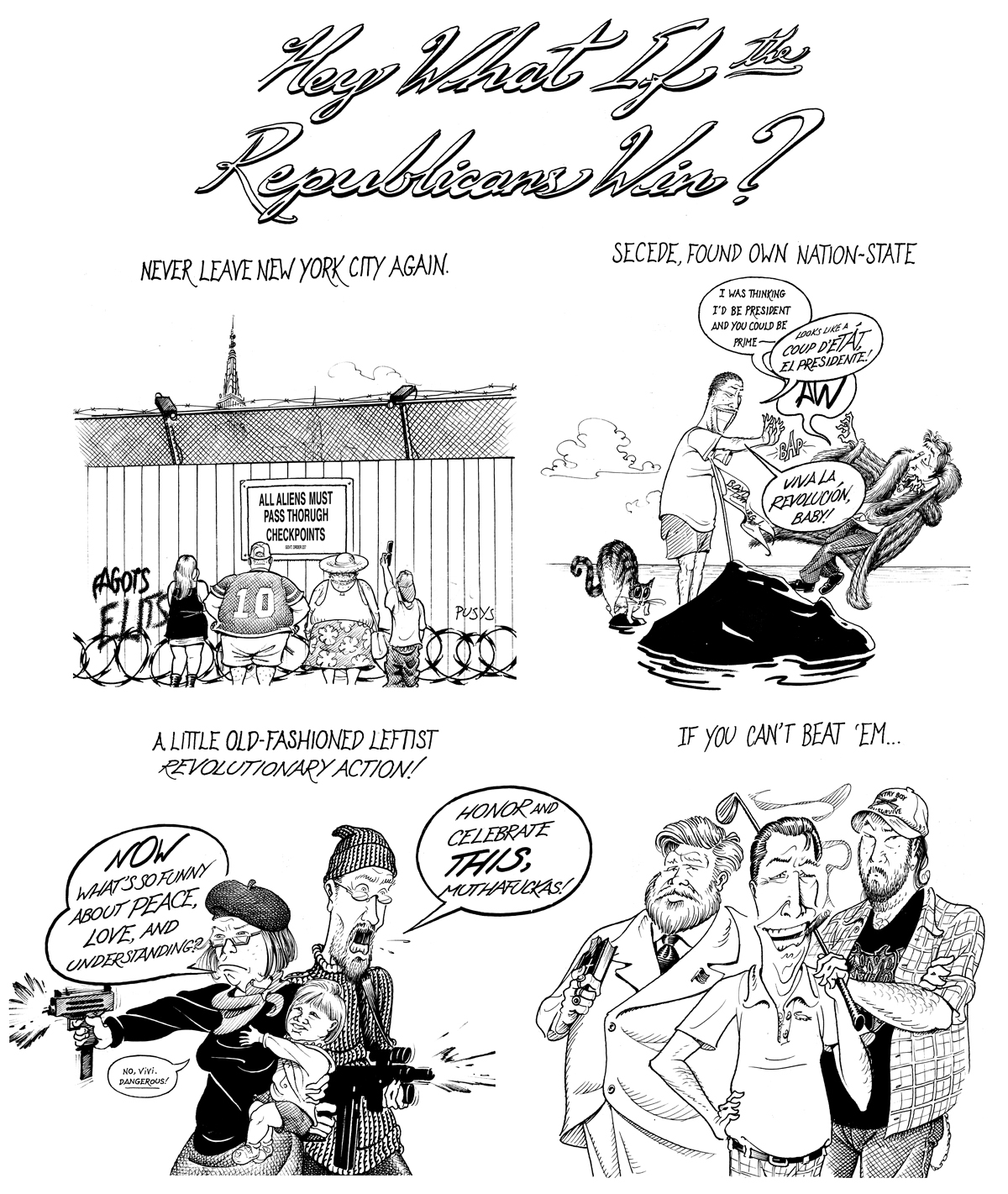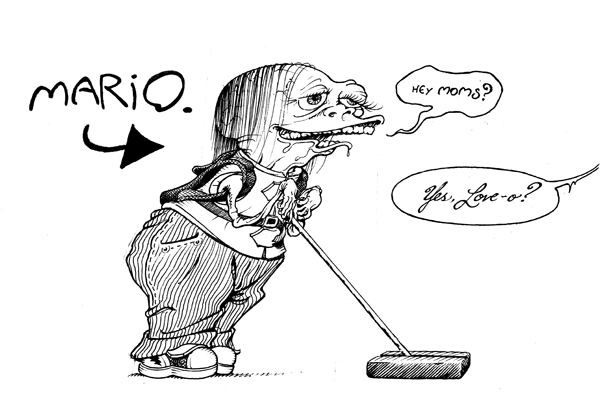Artist's Statement Artist's interpretation of Mario Incandenza from Infinite Jest, by David Foster Walllace.
The Pain notes, with a sense of loss more personal than might seem reasonable, the death of writer David Foster Wallace. Interested readers will be able to read my inadequate words on the importance of his work in the Baltimore City Paper next week. In the less formal forum of this website I will mention that I had some slight personal connection to Dave Wallace. I obtained his address through mildly illicit means to send him some of my early minicomics. Although he alluded darkly to reprisals that were even then on their way to the person who'd passed his information on to me, he forgave all because "these comix are extremely extremely fucking good." He wrote that he and his girlfriend had laughed so hard they'd "gotten all adrenalized and couldn't fall asleep," which as you can imagine made me very happy. He even used one of my jokes in a story, which did me equal parts honor and injury. I maybe got a little testy about it. Anyway the guilt gave me leverage to extort a blurb out of him for my first book, a blurb which, it being somewhat grudging, he made as ridiculous as possible. It read:
In return for this blurb he demanded the original of "Male Anorexia." A year or so after I sent him the drawing he happened to find the note I'd tucked into the back of it for the first time, in which I'd acknowledged the emotion restrained behind the cold stylistic façade of Brief Interviews With Hideous Men and told him not to worry about those obstuse reviewers. He wrote to tell me that he "was (and am) touched." We corresponded intermittently, by which I mean I wrote him effusive, confiding letters and he wrote cordial, friendly postcards in reply. I met him only once, at a book signing, where he inquired how my book release party had gone. My friend Megan, who witnessed our brief interaction, later observed that we were both "extremely well brought-up." I loved him, inasmuch as we can love people we don’t actually know, which turns out to be a surprising lot. The first time I ever heard of him was when I read “Shipping Out” in Harper’s, later republished in expanded form as the title story in A Supposedly Fun Thing I’ll Never Do Again. I kept laughing out loud in astonishment and delight and flipping ahead in hopes that there would be more, and there always was. It went on forever. I couldn’t believe I’d never heard of this guy—it was the funniest sustained piece of prose I’d read since Fear and Loathing in Las Vegas or Denis Johnson’s story “Emergency!” He seemed to be exactly the writer I would be if only I were much smarter, and a much better writer. In his recent work he had become increasingly concerned with the subject of evil, and its corollary, the question of how to be fully, consciously human, and what it means to be good. He explicitly set himself a great artistic project: writing “morally passionate, passionately moral fiction [that] was also ingenious and radiantly human fiction,” and his last essays and stories appeared to be efforts toward fulfilling that agenda. I would refer readers to his much-forwarded commencement address to Kenyon College--especially the passages in which he urges us to resist falling into lazy, unconscious habits of thought, even educated, liberal, PC, socially conscious habits of thought:
He urges us instead, through a conscious effort of imagination and empathy and will, to choose to interperet even the most frustrating and dull experiences “as not only meaningful, but sacred, on fire with the same force that made the stars.” He cautioned against enclosing ourselves in invincible, and inescapable, Hells of absolute certainty in his essay on talk radio, “Host.” I have thought of him often, and guiltily, as I drew another uncharitable broad caricature of, or composed yet another satisfyingly vituperative and self-righteous screed against, the shithead voters of the Red States. His authorial voice was always in my head like a conscience, reminding me that I knew very well that I was forfeiting fairness for humor, compromising my intellectual honestly and integrity for a good punchline. Which brings us conveniently round to this week's cartoon. Two of my readers sent me links to this piece by a liberal psychologist, taking a thoughtful, unjudgmental look at why people vote conservative, often against their own economic interests. I would urge you to read it, but if you’re too pressed for time or just too lazy I will try to synopsize: liberalism only addresses moral values of individual freedom and equality, not the equally important ones that Durkheim categorized as ingroup loyalty, respect for authority, and purity. This piece has changed and clarified my thinking on the whole topic; it has the explanatory elegance of a good theory, making more sense of all the data without resorting to reductive judgments--the equivalent of supernatural causes in science--like, "Well, they're all just idiots." I've always thought it was the Democrats who appealed to the we're-all-in-the-same-boat social contract while the Republican philosophy was more like, screw you, every man for himself, especially me, jack. It seems to me that the conservatism the author's talking about is a social/religious conservatism--the Republican base--rather than fiscal conservatism--the Republican leadership. These two factions of conservatism are really at odds at heart, the one hankering after community and ethicality, the other willing to sell out the American dream and the country's future for a rise in profits next quarter. But I suppose the evangelical base knows it's the corporate leadership that gets them access to power, and power is universally seductive. (“Again, the devil took him to a very high mountain and showed him all the kingdoms of the world and their splendor. ‘All this I will give you," he said, ‘if you will bow down and worship me.’” –Matthew 4: 8,9.) It’s true that liberalism addresses only secular needs and leaves it to individuals to fend for themselves for community and inclusion and spiritual fulfillment--wisely so, it seems to me. We’ve had enough of the religion being the state (or, maybe even worse, the state being the religion, as in Stalinism/Maoism/Jong Illism). Historically, it just hasn’t worked out all that well. So the utopia of the left is pretty much exclusively concerned with material needs and political rights. The liberal paradise is basically Canada. On the other hand, liberals are also by and large just as lost and starved for spirituality and community as conservatives. And as David Foster Wallace warns in that Kenyon address, “in the day-to day trenches of adult life, there is actually no such thing as atheism. There is no such thing as not worshipping. Everybody worships. The only choice we get is what to worship.” Among secular liberals there has been a great diaspora into a scattershot variety of newly invented, revived, and updated religions, mystical traditions, and semispiritual practices: pot-smoking Unitarians, wife-swapping Quakers, halfassed Buddhists, Dalai Lamaheads, Hare Krishnas, Wiccans, Druids, Heathens (I got a couple of angry letters from devotees of Asatru over “Science vs. Norse Mythology”), Yoga, Reiki, the Tarot, not to speak of the contemptible Scientology scam. And liberals yearn, just as conservatives do, to immerse and lose themselves in some ecstatic, Oceanic mass movement. It’s just that our reflexive skepticism prevents us from letting ourselves get carried off on the wave—a skepticism that’s usually well justified, since most of the bandwagons we’re always being urged to jump on are loaded with mean-drunk bumpkins and headed for the ditch. (I’m thinking of a conservative poster showing a grinning GI, ca. WWII, with the slogan, “How About Rooting for Our Side for a Change, You Liberal Morons.”) So we tend to create arbitrary artificial communities–what Kurt Vonnegut called granfalloons—like Burning Man or Star Trek conventions, which, although far more harmless and friendly than their conservative counterparts like Burning Negro or the Southern Baptist Convention, are still jerry-rigged and temporary and ultimately unsatisfying. The problem remains that most conservative answers to these deep human needs are simplistic and repressive and obsolete, if not outright racist and mean-spirited and stupid. The conservative paradise, where everyone belongs to one big homogenous group and unanimously reveres and supports the government and maintains strict moral purity, is Iran. And it gets hard to keep honest, fair, and charitable thoughts about my fellow Americans in my head when the economy’s collapsing and what’s on CNN is fluff about the dingbat governor of Alaska, whose name the whole country is apparently writing on its notebook covers with little hearts over the i in Palin. It seems like, having been ruthlessly screwed by eight years of deregulation, regressive taxation, trickle-down economics, and warmongering, Red America is getting ready to vote for more of the same, please. A reader of mine described the current election as “the rise of the quatra-annual Great Stupid, ready to wash down the most articulate presidential candidate in decades in a vortex of mind-numbing semi-conscious hatred.” But, see, I'm doing it again. The main challenge in trying to be decent and compassionate and empathetic is always, of course, other people. But reading George Saunders's essay in The Brian-Dead Megaphone about hanging out with Minutemen, those paramilitary wannabes who patrol the Mexican border, several of whom turn out to be medieval reënactors and have mail-order Russian brides, or Matt Taibbi's account in The Great Derangement of joining a fundamentalist megachurch in Texas and meeting the deluded divorcees and recovering drug addicts there who don't understand why their kids don't call them, or of sitting down to lunch with a group of 9/11 Truthers who'd picketed his office and finding them to be basically nice people who just get all het up on the internet, I'm reminded that the shitheads and dingbats and I vilify in my cartoons are plain old sad, screwed-up, lonely people like me. A correspondent once reported to me that Ann Coulter is a genuinely nice person--someone who really listens to you, who laughs out loud at other people's jokes, and a Deadhead besides. (Note sure whether, given her written/public persona, this makes Ann Coulter a better person I'd imagined or a worse one.) My friend John once told me I was a better person than my beliefs. I think everyone is. Belief and ideology always seem to make people more simple-minded, sure of themselves, and nastier than they really are. Ask me about all this again in November, though. This is, by the way, the first time since John's passing that I have violated our pact stipulating that I could revile Christianity and the South in my cartoons all I wanted as long as I refrained from mocking the sport of golf, which was sacrosanct to him. Not sure whether this pact is voided by his death, but it didn’t occur to me or give me pause as I was drawing the last panel, which I think it would have had John still been alive. Hopefully he would’ve forgiven me.
Our donation button is directly below; thanks again to everyone who's contributed so generously. |
.gif)


